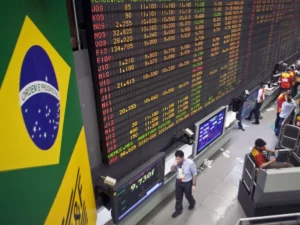The Brazilian stock market recently underwent a troubling phase, recording its fourth consecutive day of losses.
The Ibovespa index dipped by 0.4%, closing at 125,300 points—a notable decline of over 600 points.
Concurrently, the U.S. dollar soared to a peak last witnessed in March 2023, marking an increase of 1.13% to R$5.179.
Moreover, future interest rates rose across all maturities, reflecting a broader financial unease that echoed the downturns observed in New York’s major indices, which fell sharply after opening with gains.
This downturn was driven by a mix of international events and internal economic concerns.

Globally, tensions escalated as Iran launched a highly publicized attack on Israel, which managed to intercept 99% of the incoming drones and missiles.
However, uncertainty lingers about Israel’s potential counter-response, which could either escalate or defuse the ongoing tensions.
Domestically, the stock market saw mixed reactions. BRF’s shares jumped 10.15% after receiving upgraded ratings from two banks, benefiting Marfrig, which saw a 4.82% increase.
Conversely, rising interest rates adversely affected retailers and banks, with notable declines in shares of Magazine Luiza and MRV.
Additionally, Brazil’s fiscal landscape grew more complicated after Finance Minister Fernando Haddad announced a postponement of the primary deficit elimination target to 2025.
Despite efforts, market participants are cautious about fiscal adjustments’ impact on future Selic rate decisions amid global monetary policy uncertainty.

